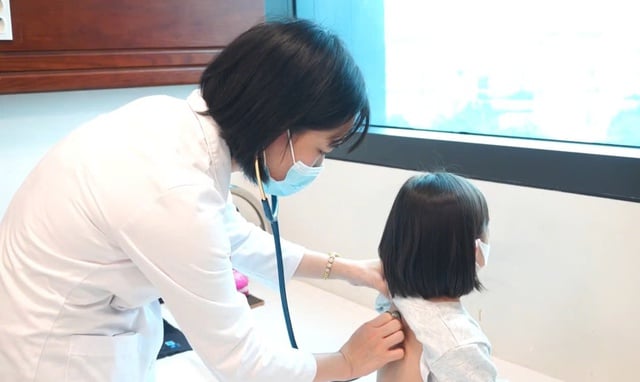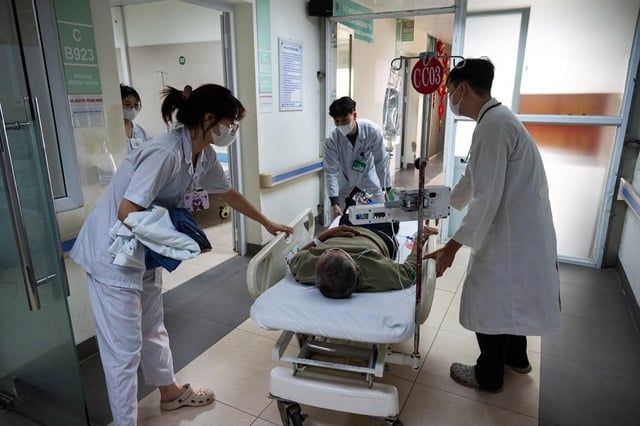Dangerous complications
At Hanoi Children's Hospital, a doctor from the Examination Department said that for the past month, the hospital has examined hundreds of outpatients and admitted dozens of children with influenza A every day.
The trend of examination and hospitalization has increased rapidly since the beginning of November. If in October there were 517 cases of flu coming for examination, 120 children hospitalized, then in the first 2 weeks of November alone there were 748 cases, 142 hospitalized.

For about a month now, the number of cases of influenza A has increased rapidly, mostly in children.
PHOTO: PHAM THAO
According to Hanoi Children's Hospital, for children with influenza A, pneumonia is one of the most common complications, which can be caused by the influenza virus or by bacterial superinfection. The disease can lead to respiratory failure with symptoms of difficulty breathing, rapid breathing, cyanosis, requiring timely emergency care.
In addition, children with influenza A often have complications such as bronchitis and laryngotracheobronchitis. These complications aggravate the respiratory condition. Children with influenza A are also at risk of other complications: otitis media, sinusitis; and gastrointestinal symptoms such as diarrhea and vomiting.
Although rare, myocarditis and encephalitis are also risks when infected with influenza A...
To recognize the signs of flu during the current epidemic, doctors recommend that parents take their children to the hospital when they have the following signs: high fever, persistent fever that does not respond to fever reducers, rapid breathing, pale lips, chest pain, refusal to breastfeed, persistent vomiting, convulsions, and lethargy.
"You should not test for influenza A yourself because the family member's sampling technique may be incorrect, leading to incorrect results and possibly causing damage to the child's airway. Families should also not buy immune-boosting products for their children to use because the use of drugs and immune-boosting products requires prescriptions or advice from medical staff and specialists," the doctor of the Examination Department noted.
At the Central Hospital for Tropical Diseases, the number of outpatients examined and treated for influenza A has also increased rapidly, most of them children. Among them, there is a 16-month-old patient (Hanoi), diagnosed with influenza A, hospitalized due to bronchitis and pneumonia.
Three days before being admitted to the hospital, the baby had a high fever, runny nose, and a dry cough, followed by wheezing and coughing up thick phlegm. Chest X-rays upon admission showed damage to the bronchi and lungs on both sides, and obvious bacterial infection. Fortunately, the baby was discovered and treated promptly, avoiding dangerous developments.
Another case is a 10-year-old girl who was admitted to the hospital with a high fever of 39.5°C. Test results confirmed that she had influenza A. The patient's family said that the child coughed a lot, vomited a lot (more than 10 times/day), and could not eat or drink. In addition, the child had symptoms of pain and fatigue in her bones and joints throughout her body and had severe headaches. The patient was then treated according to the correct regimen, and was also given pain relief, anti-vomiting, electrolyte replacement, and close monitoring.
Influenza A is not "benign"
Master, Resident Doctor Nguyen Dinh Dung (Central Hospital for Tropical Diseases) said that influenza A is an acute infectious disease transmitted through the respiratory tract, which can occur at any age, but young children, the elderly or people with underlying diseases are at higher risk because their immune systems are weak and susceptible to serious complications.

Influenza A infection causes severe illness in people with chronic diseases
PHOTO: VAN ANH
Notably, according to Dr. Dung, the early stages of influenza A are often similar to other respiratory viruses, but the disease can progress very quickly, causing serious complications such as pneumonia, respiratory failure or sepsis if not detected and treated promptly. Therefore, parents need to closely monitor their children's health.
When children show signs of illness or fever, they should be taken to the nearest medical facility for examination, early diagnosis and proper treatment. Do not use drugs at home on your own, especially antibiotics. Children should be taken to the doctor promptly for proper treatment to limit serious complications.
Records at the Central Tropical Hospital, Thanh Nhan Hospital, and the Central Infectious Diseases Hospital show that many adult patients infected with influenza A were hospitalized due to serious illness, most of whom had chronic diseases: diabetes and cardiovascular disease.
At Thanh Nhan Hospital, from October until now, the Infectious Diseases Unit has admitted 184 patients with influenza A, nearly half of the total number of cases for the whole year (in the past week alone, there have been 30 new patients with influenza A).
Regarding influenza A, Dr. Duong Quoc Bao (Dong Da General Hospital) pointed out that influenza A is a common respiratory viral infection that occurs year-round and often increases sharply during the changing seasons. Most cases only show symptoms of fever, cough, sore throat, fatigue and go away on their own after a few days.
However, influenza A is not as "benign" as many people think. When subjective or self-treated incorrectly, the disease can progress rapidly and cause a series of dangerous complications, especially in young children, the elderly, pregnant women and people with chronic underlying diseases.
One complication that is less noticed is cardiovascular damage. The influenza virus can cause myocarditis, arrhythmias, or aggravate existing cardiovascular diseases such as high blood pressure, heart failure, and coronary artery disease.
In the elderly or people with underlying diseases, the risk of myocardial infarction and stroke also increases during and after influenza A infection. Therefore, these patients need to be closely monitored for signs of chest pain, palpitations, sudden fatigue or difficulty breathing.
Do not self-medicate
Faced with the reality that many people are testing for the flu, specialist doctor Nguyen Nguyen Huyen, Director of the Center for Disease Prevention and Control, Central Hospital for Tropical Diseases, said that the flu test results have guiding value, to protect health and have measures to isolate and protect relatives and the surrounding community.
However, do not rely on these test results to prescribe treatment for yourself, because a prescription for a patient depends on many factors: liver and kidney function or underlying diseases and chronic diseases.
"People infected with the flu should not buy antiviral drugs to take on their own, because sometimes it can cause serious uncontrollable consequences and can increase the virus's drug resistance," Dr. Huyen noted.
Source: https://thanhnien.vn/cum-a-tang-nhanh-tai-ha-noi-185251116145351514.htm











































































































Comment (0)